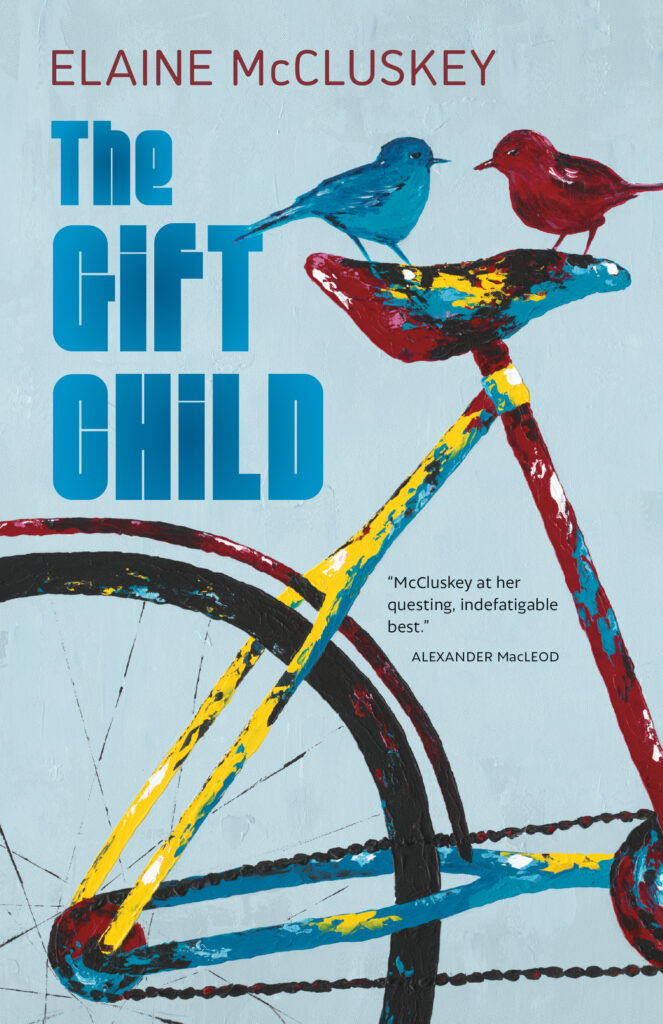The Gift Child
A funny, poignant, sure-shot novel, populated with a community of petty criminals, beloved broadcasters, undercover intelligence agents, and more.

From The Gift Child
“You can see dreams in the air. They look like lucent white lights. You can smell them; they smell like the musty whiff that comes off a lake at five a.m. You can taste them; they taste like Côtes du Rhône. There are the fleeting dreams that fizzle, and you almost forget they existed, and there are the big dreams that crash and take part of you with them. I dreamed of growing old in an art-filled stone townhouse with a tiny, framed handprint on one wall. Peter dreamed of going to the Olympics. My mother dreamed that we would both be happy. Stan dreamed of being Stan Swim. It wasn’t more complicated than that.” Harriett Swim, narrator

Advance Praise
A work of exuberant, investigative gusto, this book has everything. A massive tuna head in a bicycle basket? An egotistical minor celebrity newsman? Petty, and not so petty, crimes? Mysterious disappearances? All the unidentified objects that have ever shimmered in the sky or sunk beneath the waves of Shag Harbour? How does it all fit together? How can it? An often-hilarious detective story about the making and unmaking of stories, about the search for truth, and about the complications of love and family, The Gift Child, is McCluskey at her questing, indefatigable best.
—Alexander MacLeod, author of Animal Person
Nobody else writes like Elaine McCluskey, one of my CanLit lodestars, whose brilliance as a word-wielder is second only to her understanding of the tragicomedy of the human condition. The Gift Child, a strange and twisting family saga populated by lost souls, aliens, TV news anchors, Dartmouth separatists and fish heads, will make you cry with laughter and break your heart at once.
— Kerry Clare, author of Asking for a Friend
The latest from the inimitable Elaine McCluskey feels very much like the novel she was born to write. The Gift Child follows Harriett Swim, a middle-aged casino worker investigating the messy turmoil of families, of panic and theft and fog, and it seems to contain the whole of the world — transplanted hearts, UFOs, Dartmouth and Halifax and Barrington, Russian spies, missing persons, and petty crime — and as all of these loops interlace, we learn about the greater garment of mothers and fathers, of romantic love. The book is like holding the radiograph of your own heart: black and white, unsparing.
— Nicholas Herring, author Some Hellish
Reviews
“McCluskey’s galloping story, at once comic and slyly observational, is twisty and occasionally absurd – with red herrings and shaggy dog detours – but highly relatable. The Gift Child also teems with insights into the human condition and snappy turns of phrase. “Beautiful people are like that, aren’t they? … ” she writes. “They do not see you. They see your reaction to them. They see you falling under their spell; they see you toppling into something you have no business toppling into. And the harder you fall, the more wondrous they seem.” Zoomer Magazine
“McCluskey is a delightfully deft stylist; her sentences are replete with striking images, as with her description of the old Swim house in Pollock Passage, where the shirts on the clothesline “flapped and fluttered like hope.” Overall, Harriett is enjoyable company as she struggles, as we all do, to make sense of the many scattered elements of her own experience in service of what she aptly sums up as “a forensic self-audit to figure out Me.” Quill and Quire
“One thing is for sure, Elaine McCluskey captures the goofy spirit of Nova Scotians with precision, charm, and wit. This novel is sure to please.” Miramichi Reader
“The Gift Child proceeds on the irony of directionlessness. In their search for Graham, Harriett’s family follows a variety of false leads buried in the opacity of police procedurals. That her narration is part of a memoir about the messiness of truth is undisguised; she acknowledges that it is an undifferentiated mass of lies, multiple truths, secrets, and memories warped by time. This purposelessness is wrought beautifully in Harriett’s profuse description of sea-blown settings: Pollock Passage is ‘a smattering of white wooden houses, a working-class Atlantis. Some dropped on the shoreline, some further inland.’” Foreword Reviews

